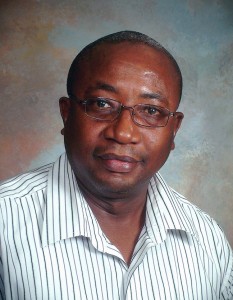By Ernest Cole
 As a student of English at Fourah Bay College, University of Sierra Leone, I was attracted to the works of Nathaniel Hawthorne. His rendering of the character Young Goodman Brown was compelling to me.
As a student of English at Fourah Bay College, University of Sierra Leone, I was attracted to the works of Nathaniel Hawthorne. His rendering of the character Young Goodman Brown was compelling to me.
Of particular importance is Goodman Brown’s search for the truth, and his journey into the forest where he confronts the reality of human existence.
Growing up in the east end of Freetown in my native Sierra Leone, I was always fascinated by masquerades. As a young boy trying to make sense of masquerades, some representing different tribal, spiritual, and cultural affiliations, I always wondered about the identity of the person behind the mask. I would quietly question the necessity of the mask. In my young mind I would ponder on the fact that if the masquerade signifies community involvement and entertainment, why should the identity of the person be concealed?
It seemed to me that the mask offers the person behind it a tremendous place to hide because of the barrier it presents to the community to recognize the person, his motives, and the reason for his actions. Because of this tension between knowledge and ignorance, the masker is in a position of power from where he could not only manipulate but, more importantly, deceive members of the community who are ignorant of his identity.
As I now ruminate on these issues, I again recall Hawthorne’s character who, in his quest for the truth, ended up losing his sanity because he could not handle the reality of what he saw.
It seems to me that perhaps Hawthorne is using Goodman Brown to point out a particular truth about our lives, and I begin to suspect that there is a connection between truth and masking. In my childhood days, I was troubled by the fact that the person behind the mask could clearly identity each and every member of the community and yet we could not identify him, except select members of his group. This sense of exclusion and secrecy bothered me, and so, I came to associate masks with suspicion and secrecy.
However, with time, I realized that perhaps I should reverse my focus on the significance of masks.
Rather than focusing on what the mask conceals, it may be more interesting to concentrate on what the mask reveals.
This struck me as a critical fact because after all aren’t we are all like masquerades? Don’t we all have different personas that we put on for different occasions? From the pious persona we put on in church on Sundays to the scholarly persona we display in front of our students during the week, aren’t we all masking?
Is this what life is about? Do we all put on masks and conceal our true identities behind them? If this is true then I wonder how my students perceive me. Is my identity that of the professor they see in class? Are they making a distinction between the persona of the professor and the persona I display with colleagues at Butch’s restaurant, for instance?
One may say that humanity is a combination of multiple personas. If this is true, is it ever possible to determine the true identity of people? Can we truly know one another? Our colleagues, our students, our kids, and our partners?
Perhaps this is not the essential question. Maybe, once again, I should shift my focus on masks and masquerades. And so, as I grew older, I re-frame the question: is masking necessary? Is there any value to masking? For some of us interested in searching for the truth of existence, isn’t masking an impediment to the process? Can we ever know the truth in the face of multiple personas that mask character and conceal identity?
And so going back to Hawthorne’s short story, it strikes me that maybe there is value in masking after all. If we cannot handle the naked truth, that deception exists in many forms and that it is integral to human existence, then we, like Young Goodman Brown, do need masks. Can we handle what people really think of us? Do we really want to know what lies behind every friendly smile and greeting?
Now that I am in mid-life I have come to appreciate masking and masquerades. I have come to realize that in spite of the manipulation, it is good for my sanity. It shields me from the rude shock of knowing the truth. I have accepted it as my safety valve. I take solace in the fact that in the world of international politics, it is called diplomacy. However I wonder whether this make me a diplomat after all.

